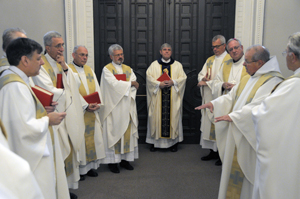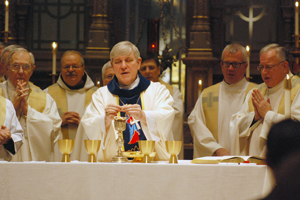
ST. FRANCIS – His résumé might give the impression that Milwaukee’s 11th archbishop is driven: Captain of his high school tennis team, basketball coach, degrees in civil and church law, 24 years in the Army Reserve, moral theology professor, parish priest, pastor and bishop. But he doesn’t view it that way.
“I don’t see myself as driven; I see myself as responding to needs. I’ve been the proverbial ‘If you want something done, ask a busy man.’ A busy man or woman will find time to get it accomplished,” Archbishop-designate Jerome E. Listecki told your Catholic Herald Saturday Nov. 14, the day his appointment to Milwaukee was announced.
Archbishop-designate Listecki, 60, a native and priest of the Archdiocese of Chicago, was named an auxiliary bishop in his home archdiocese in 2000. He was appointed bishop of the Diocese of La Crosse in 2004.
Love of family
The older of Harry and Alfreda Listecki’s two children, he grew up on Chicago’s southeast side. His dad owned a bar, and later worked for the Chicago Transit Authority.
“I’m the black sheep of the family,” Archbishop- designate Listecki joked. “I come from six generations of bar owners; I broke the streak.”
The archbishop-designate described his deceased father as a “hard working guy who was a very ethical Catholic.”
“He thought Pope Paul VI was the greatest pope because he lifted the Friday abstinence from meat. My dad hated fish,” he said.
Archbishop-designate Listecki termed his mother, also deceased, a “devotional woman with a heavy reliance on daily prayer.”
He holds his sister, Penny, born 11 months after him, in high esteem, calling her a “remarkable woman.”
“She is the single most important person for my priesthood and my episcopacy,” Archbishop-designate Listecki said. Penny has taught junior high in Chicago’s Catholic and public schools for more than 34 years.
Work ethic
While St. Michael Parish helped form the future archbishop in the faith, another neighborhood entity, the steel mills, also made a lasting impact upon him due to the college summers he worked shoveling slag.
“They’re all doing it (working) so they can put food on the table for their kids, so they can have a home for themselves and their families. It made me appreciate the people who do the work,” he said.
The dirty work in the mill also influenced the work ethic he employs as a bishop.
“I will never ask anyone to do anything that I wouldn’t do myself. That means if I’m asking us to clean up, I’ll wash windows. I’ll wash floors,” Archbishop-designate Listecki said. “You don’t want me to cook, but I’ll do the dishes. I see us working side by side. If I’m not willing to expend that energy, why should someone whom I’m telling to expend that energy? Why should they?”

One gift – priesthood
Asked what gifts he brought to the archdiocese he will lead shortly after the start of the new year, Archbishop-designate Listecki spoke in the singular.
“The gift I have been given by God is the priesthood – the call to priesthood. I don’t know if anything I possess is any more extraordinary than (what) any others I’ve met possess,” he said, noting that there were others who were more gifted than him in linguistics and moral theology. “I’ve been given the priesthood and that maximizes anything that I do. It’s held up for Christ.”
The archbishop-designate said that when he encourages men to consider the call to priesthood, he uses St. John Vianney as an example.
“You may not be the smartest individual in studies. You may not necessarily be the most gifted preacher. What you are going to do if you have an open and generous heart is to allow God – our Lord – to use you as an instrument,” he said. “If you get that sense, don’t worry; the gifts will be used properly.”
‘Just a pastor’
Archbishop-designate Listecki attributes the energy with which he approaches his work to one thing.
“I’m a believer,” he said. “Because of that, there’s an urgency to get the message out. You don’t want to miss opportunities of encounter when you can bring people to the Lord, where you can share the Lord with people, or you can challenge people to meet the Lord.”
Even though the archbishop-designate spent all but six months of his priesthood teaching in the seminary, his plan when he was studying for the priesthood was to be a pastor.
“My focus has always been that of pastor,” he said. “A true pastor is taking care of his people, but he’s also trying to make sure he goes out to dialogue with people.”
Archbishop-designate Listecki termed being with people and hearing their stories “a favorite pastime.”
“That empowers me. I found that about myself. I work all day at the office, with meetings, and I’m tired. I’m driving two hours to get to confirmation; as soon as I see those kids, I suddenly get energized,” he said, calling administering the sacrament of confirmation “one of my favorite things to do as bishop.”
Prayer is essential
Archbishop-designate Listecki celebrates Mass every day and says the Liturgy of the Hours. His prayer life also includes recitation of the rosary, meditation and spiritual reading.
“The priest or bishop who doesn’t pray is not going to be a successful priest or bishop, and he won’t be a priest or bishop too long. You’ve got to be connected to God,” he said. “You always put yourself in a position to try and understand what God wants from you rather than what you want from God.”
That prayer life has helped him put his appointment to Milwaukee into context.
“Whatever is happening here and now in a given time, there is an overriding aspect of the relationship with God that I am responding to,” he said. “We are all instruments of God’s presence in this life.”
